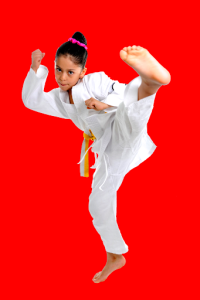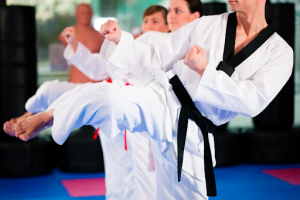“What to know when your child wants to be a Black Belt!”
“The cave you fear to enter holds the treasure you seek.” -Joseph Campbell
Joseph Campbell was an American mythologist, writer and lecturer. He wrote a wonderful book title ‘The Hero with a Thousand Faces’. This book describes 12 stages of the human experience that relate directly to the transformational process your child will go through in becoming a Black Belt. The process will transform them from an ordinary child into an extraordinary leader. We call this The Great Journey. Campbell describes it as ‘a process that challenges an ordinary person to become a hero by answering a call to adventure’. And, he defines a hero as someone who willingly gives their life to something bigger than themselves, someone who goes out and achieves great deeds on behalf of their group, tribe, or civilization. As a parent not understanding this process will result in your child losing out on an opportunity to become someone capable of achieving great deeds for their family, community and country. I’m sure you know adults who have not lived up to their potential. This is what’s at stake – your child’s future – and who they will become.
Stage 1 – The Ordinary World
In the Hero’s Journey we are introduced to the hero in a sympathetic way. This causes us to identify with them and the situation or dilemma they are in. The hero is uneasy because of something that is causing stress. When we first meet your child, it is against a background of their personal life. Something is pulling at them. This could be shyness, timidity, laziness, bad behavior, poor focus, poor grades, lack of self-control, inability to stand up for themselves, a bully who is terrorizing them, lack of exercise, or any of a number of things. As a result, they and you may be uneasy, uncomfortable or unaware.
Stage 2 – The Call to Adventure
The hero is presented with a problem, challenge, or adventure. It’s a time of change, turmoil, and uncertainty. You or your child want something more. You may recognize the cause of the unease and want to address it, or your child may have a special gift and you want to steer them towards a challenge that would stimulate them to grow. Or, there’s a shakeup in your situation caused by an external force or something rising up from deep within.
Stage 3 – Resisting the Call

Stage 4 – Meeting the Teacher
Your child meets their teacher who tests them to determine their potential. The teacher will agree to take them on as a student only after they demonstrate the capacity and willingness to learn. Your child doesn’t need to have exceptional talent but they do need to be willing to listen, do what they’re asked to do, and work hard. Your child’s initial contact with their teacher is not enough for them to really know and appreciate what their teacher can do for them. This takes time and it is the formation of a sacred bond. If the time is given, your child will come to believe that anything is possible with the guidance of their teacher. In addition to meeting their teacher your child will meet senior members of the school who will mentor them and play an integral role in their development as an extraordinary human being. Our instructors and senior members are highly trained individuals who are passionate about guiding young people on their Great Journey. But the teachers and mentors can only go so far, eventually the hero, aka: your child, must face the unknown by them self.
Stage 5 – Crossing the Threshold
For Campbell this is the stage where the Hero fully enters the story’s special world for the first time. This is the moment at which the story takes off and the adventure gets going. The balloon goes up, the romance begins, the plane or spaceship blasts off, the wagon train gets rolling, or Dorothy sets out on the Yellow Brick Road. The hero is now committed to his journey and there’s no turning back. For your child this is the start of their Black Belt training. They’ve made the commitment; they’re going all the way. This commitment is vitally important. Without it your child will not succeed. They will not be able to withstand the failures and disappointments that lie ahead. But they will only commit if they know that you will give them your entire support. Anything less and they may believe that you don’t think they’re capable. If they sense that you are wavering, or that you are waiting for them, then they will not commit and their progress will be halted. Project this into the future and you run the risk of them being unable to commit to anything significant in life. They must see that you are behind them 100%.
Stage 6 – Allies, Enemies and Tests

Stage 7 – Approach

Stage 8 – The Ordeal

Stage 9 – Reward
Surviving death, beating the dragon or slaying the enemy now puts the hero in a position to seize the prize he’s been after. Sometimes it’s a special weapon, or a token, or an elixir, or it’s knowledge and experience that leads to greater understanding. This is when they earn their Brown Belt. It’s a major accomplishment. They now possess knowledge and skills that are above the ordinary. They have earned a level of maturity that is above average for their age. Their peers now see them, as someone of substance who cannot be ignored and must be reckoned with. There may be celebration but there is also the danger of losing what they have earned. The real prize – Black Belt – has not yet been attained.
Stage 10 – The Road Back

Stage 11 – Resurrection
From his research Campbell discovered that the hero would invariably emerge from his ordeal transformed by the experience. Often there is another instance of the death-rebirth experience as the hero faces death and survives. With each experience they gain greater control of their powers. They are not the same person they were when they started, they are transformed into someone greater. Your child’s Black Belt test is the climax of their many years of training. They again are severely tested. The experience leaves them purified. It is another moment of death and rebirth, but on a higher and more complete level. With this supreme effort, the forces that caused conflict at the beginning are finally resolved.
Stage 12 – Return with the Treasure

First, they will be well rounded in their studies and personality. They can set goals, create plans and follow through and reach those goals. They will think on their feet better than their peers. This will give them an advantage in dealing with them. They will be quick to identify problems and holes in arguments. Their decision to seek excellence in all they do will propel them to success in all situations. The steady process of making life and death decisions will spur them to act with courage, courtesy, integrity, humility and self-control in all situations. They will have a strong sense of themselves and a high level of confidence in what they say and do. They got this way from repeatedly forming and articulating their own opinions. They stand tall and walk with a sense of purpose. When they introduce themselves to others, they look them in the eye, extend their hand and speak in a clear voice. They’re polite, confident and self-assured. They work well with others and they give them the sense that they are not someone to be trifled with. When others talk to them, they know that their complete attention is on them and that they understand what they have to say. When they say they’ll do something; they do it. It doesn’t matter how much harder it is than they initially thought; they said they’d do it; so, they do it. Whining and complaining are not options. They will quickly assess a situation and do what in their heart they know has to be done even if no one else is doing it. They know they’re only as good as their word, and they know that setting and keeping high standards for themselves is what’s going to make them sleep easy at night. They’re a good man or woman, and would make any parent proud to call their child.
References:
The Hero with a Thousand Faces, by Joseph Campbell
A Practical Guide to Joseph Campbell’s The Hero with a Thousand Faces, by Christopher Vogler


















